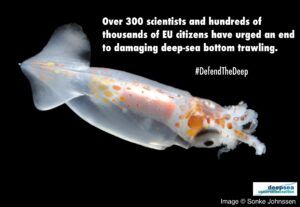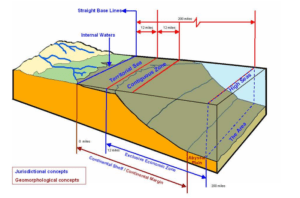
Most eyes are on the UK’s EU ‘in-or-out’ referendum, but meanwhile our MEPs are considering important fisheries decisions; namely whether we act now to place urgent limits on deep sea bottom-trawling
Over the next few weeks (or possibly months), European representatives should – after years of negotiation and political delays – decide how best to regulate the damaging effects of deep sea bottom-trawling across European waters and to sustainably manage vulnerable deep-sea fish. Deep sea bottom-trawling is a form of fishing that tows weighted nets across the seafloor at depths well beyond the continental shelf. Due to the serious damage it can cause to fragile marine ecosystems, scientists across Europe have called for it to be banned. However, deep sea trawling is still permitted across large areas of our shared waters.
Scotland’s sea area comprises 10% of Europe’s marine EEZ and some of its most productive waters. Scottish and other UK MEPs could therefore play a role in shaping the views of European Parliament about ongoing proposals to regulate deep sea trawling. The proposed regulation to reform the management of deep-sea fisheries has collectively become known as the ‘deep sea file’ which has had a tortuous and controversial passage through our European law-making institutions.
The history
For well over a decade the United Nations has urged the world’s countries to act urgently to stop damaging deep sea marine ecosystems. In the past few decades our fishing technology has become so powerful that we can now plumb depths of 1000 metres and more, towing heavy nets over seabed habitats that we still know very little about. We are slowly learning that they contain an incredible diversity of life, which is very fragile and highly vulnerable to bottom-towed fishing gear.
Back in July 2012, the European Commission therefore proposed a new regulation for fishing deep-sea stocks in EU and international waters of the Northeast Atlantic. As well as management provisions and impact assessments for deep-sea fisheries in new areas, the Commission proposed to phase-out the use of the most highly damaging methods that actively ‘target’ deep-sea species – bottom trawls and bottom gillnets. At the time, over 300 international scientists, including leading UK and Scottish researchers, called on EU policymakers to transform deep-sea policy and support the phase-out of deep-sea bottom trawling. However, in 2014 the European Parliament narrowly voted against the proposals, due to a last-minute complication in the vote which led to supporters of the phase-out accidentally voting against their own view. Thankfully, although failing to adopt the phase-out, they nonetheless voted an ambitious reform of the regulation. Depsite some Member States, notably Spain and France, seeking to water down the regulation, specifically the phase-out measure, a groundswell campaign encouraged the European Council of Ministers to reintroduce the deep sea ban proposal and to finally adopt a position in November 2015. In late 2013, nearly 900,000 people signed a French petition urging French President, Francois Hollande, to end destructive deep-sea bottom-trawling. Such mobilisation of citizxens, scientists and the media led France’s largest supermarket retailer, which also owns a fleet of deep-sea trawlers, to stop all bottom-trawling fishing operations below 800m.
How does this fit in with MPAs?
The Save Scottish Seas campaign has focussed a lot on MPAs because we think they are one of the crucial tools for managing our marine environment. Scotland’s seas are vast and extend well beyond the 12 nautical mile boundary. As well as inshore MPAs, Scotland has a number of offshore MPAs and SACs, including some of the largest in Europe. However there is currently no site specific fisheries management in place for many of these sites in order to protect the specific feature that they are designated for. So, development of fisheries management for the MPA network is vital. Eventually there is likely to be management specifically for protecting features inside Scottish offshore MPAs, but that process has stalled – read our update here.
Deep-sea decision day is approaching
So where are we now? Last November, with the Council adopting its position, the Parliament was at long last able to enter into a process known as Trilogue – negotiations with the Fisheries Council and the European Commission – possibly one of the most democratically opaque processes within the European Union. which will influence the overall package of measures that is finally agreed. In general there is a package of measures on the table that ranges from:
- A restriction to bottom trawling at depths below 800m or no depth-based limit to bottom trawling.
- A restriction to bottom-trawling at depths below 800m that applies to both vessels targeting deep-sea species and those that catch deep-sea species as bycatch; or the same limit but that only applies to vessels targeting deep-sea species (the latter is a new proposal by the EPP group that would seriously undermine the conservation value of a depth limit to bottom trawling).
- Area closures to fishing where vulnerable ecosystems are known or likely to occur applying to both vessels that target deep-sea species and those that catch deep-sea species as bycatch; or areas closed only to vessels targeting deep-sea species (the latter is a new proposal by the EPP group that would severely undermine the conservation value of area closure)
- Impact assessments prior to exploratory fishing in new areas with exploratory fishing operations limited at 800m depth or allowed below 800m.
- Application of the new regulation to Union waters only or to both Union and international waters of the Northeast Atlantic waters.
The politics
The Fisheries Council supports a depth-based limit to deep-sea bottom trawling and area closures to protect vulnerable marine ecosystems but proposes that the scope of application of the new regulation be restricted to EU waters only, exempting as such key EU bottom-trawling fleets as Spain from any requirements of the new regulation.
The European Parliament is currently slightly divided. Some MEPs are immensely supportive of the strongest measures and want them applied to the whole NEAFC waters, but others are less keen. The negotiation is led by the rapporteur Isabelle Thomas MEP who does not currently favour the wholesale phase out of deep sea trawling, but shadow rapporteurs Yannik Jadot supports stronger measures to restrict damaging deep sea fishing. Certain UK MEPs are closely involved in the negotiations, namely Scotland’s Iain Duncan MEP (Conservative politician and member of the Conservative Reformists Group) who is another ‘shadow rapporteur’ on the file and commented on the process here and Richard Corbett MEP (a UK Labour politician and member of the Progressive Alliance of Socialists and Democrats) who is a member of the European Parliament’s Fisheries Committee.
Our view
Many of our marine campaign members – alongside other Scottish Environment LINK members such as Nourish Scotland – are also members of the Deep Sea Conservation Coalition which strongly advocates:
- Supporting the 800m depth limitation to bottom-trawling and ensure that this limit applies to both vessels targeting deep-sea species and those catching deep-sea species as bycatch.
- Ensuring that the 800m depth limitation to bottom trawling applies to exploratory fisheries.
- Ensuring that closed areas to bottom fishing operations where vulnerable marine ecosystems are known or likely to occur be closed to all bottom-trawl vessels, both those targeting deep-sea species and those catching deep-sea species as bycatch.
- Ensuring that the new regulation covers straddling stocks of deep-sea species in both EU and international waters of the northeast Atlantic and support that the scope of the regulation includes, at a minimum, the international waters of ICES sub-areas V, VI, VII, XIIa2, XIIb..
You can read the most recent coalition call for prioritisation of action here.
What can you do?
Email your MEP. The direction of decision-making is far from clear and our representatives need a clear reminder that there is a strong support for protecting our marine environment. If you want to find out more about the damaging impacts of deep sea fishing and the subsidies that underpin the industry, please follow these links:
No MEPs in Scotland have ever stood for election to the European Parliament proposing to manage deep sea fisheries in a specific way. We would therefore urge people who are interested in this issue, to contact your MEP and let them know your views.
Scotland is represented by six Members of the European Parliament. You can contact any or all of them by visiting this page
David Coburn (United Kingdom Independence Party (UKIP)/Europe of Freedom and Direct Democracy group)
Ian Duncan (Conservative Party/European Conservatives and Reformists Group)
Ian Hudghton (Scottish National Party/Group of the Greens/European Free Alliance)
David Martin (Labour Party/Group of the Progressive Alliance of Socialists and Democrats in the European Parliament)
Alyn Smith (Scottish National Party/Group of the Greens/European Free Alliance)
Catherine Stihler (Labour Party/Group of the Progressive Alliance of Socialists and Democrats in the European Parliament).

